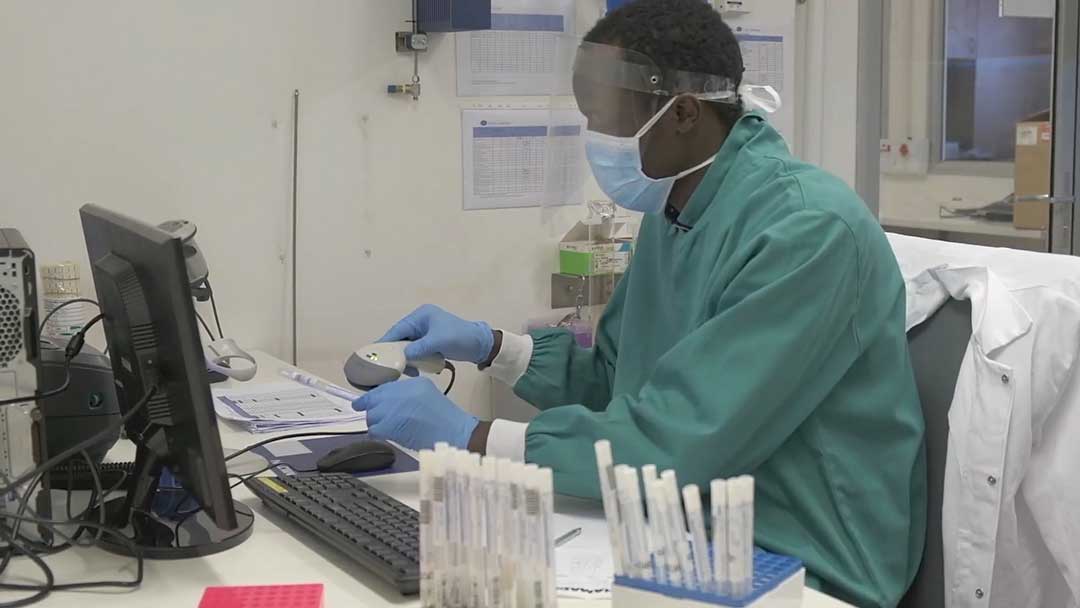African Researchers Among World Leaders in Identifying COVID-19 Variants
ADF STAFF
When South Africa experienced a COVID-19 outbreak at a hospital in Durban in early 2020, researchers at the nearby KwaZulu-Natal Research Innovation and Sequencing Platform (KRISP) swung into action.
Teams there examined hundreds of virus samples taken from patients at the hospital, identifying each sample’s genetic fingerprint and adding that information to the growing global bank of data related to the pandemic.
Since those early days, Africa’s genomic laboratories have led the world in detecting the kind of changes to the COVID-19 virus that give rise to variants, such as delta and omicron, that have increased the virus’s lethality or transmissibility.
In Nigeria, for example, Professor Christian Happi of the African Centre of Excellence for Genomics of Infectious Diseases was the first to identify COVID-19 on the continent. His lab also identified the variant of interest that the World Health Organization (WHO) labeled eta.
Researchers in Botswana, Ethiopia, Senegal and elsewhere also have contributed to the world’s understanding of COVID-19. South African researchers, however, have emerged as the continent’s leading variant detectives, thanks to decades of tracking the evolution of HIV and other diseases. KRISP is a world leader in viral phylogenetics, the science of detecting variants.
In their laboratories, South African researchers use some of the most advanced technology in the world to read the genetic makeup of viruses.
“It is important for the African continent to have a large genomics facility with the latest cutting-edge technology needed to lead in genomics surveillance,” Professor Tulio de Oliveira, director of the recently created Centre for Epidemic Response and Innovation, told Illumina, the company that makes the machinery used to analyze viral genetics.
By doing their own analyses, African countries save time they would otherwise expend sending samples abroad to be identified. Public health leaders can use that time to thwart the spread of infectious diseases.
South Africa sounded the alarm in late November about the omicron variant, which was discovered in Botswana. Omicron has swept the globe and replaced the delta variant in many countries.
Before omicron, South African scientists detected the first COVID-19 variant, later named alpha, and the beta variant that came in mid-2020. In mid-2021, they also identified variant C.1.2, the most mutated version of COVID-19 discovered before omicron.
Africa Centres for Disease Control and Prevention (Africa CDC) Director Dr. John Nkengasong recently praised South Africa for the power of its surveillance system, its dedication to transparency, and its quick response when sharing information about omicron and other variants.
“If everyone around the world was doing that, we would be in a very good place,” Nkengasong said during a recent press briefing.
South Africa’s success at tracking the evolution of COVID-19 is due in part to the Network for Genomic Surveillance in South Africa, which was set up in June 2020 to unite laboratories and researchers across the country and pool their data to guide public health measures.
The network has become a key component of the Africa Pathogen Genomics Initiative, a joint project by the WHO’s Africa regional office and the Africa CDC to connect a dozen sequencing labs across the continent.
Since September 2020, the initiative has led to a fivefold increase in genomic sequencing across the continent. By the end of 2021, it had contributed more than 61,600 COVID-19 sequences to the global database, more than 40% of which had come from South Africa.
Despite enormous progress, Africa remains far behind other continents in the percentage of samples it has sequenced. Even with the continent’s most advanced genomic facilities, South Africa still has sequenced less than 1% of its overall cases.
Peter van Heusden, a bioinformatician at the South African National Bioinformatics Institute, told Devex that the continental network needs to ensure that all countries have adequate laboratory capacity to improve understanding of the pandemic.
Africa CDC and the WHO are working with KRISP and other labs to train more scientists in the skills needed for sequencing the COVID-19 genome.
“Thankfully, the speed and transparency by Botswana and South Africa in detecting and alerting the world to the new variant has been for us an important issue,” said Dr. Abdou Salam Gueye, regional emergency director for WHO Africa. “They have given the world an early start in mounting an early response.”


Quite impressive and encouraging to know that Africa is playing major at this critical period in world history.